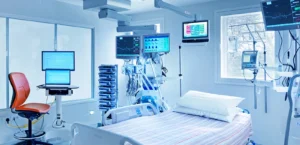There isn’t a single person that we can meet in this globe who has not been familiar with the ICU department within Hospitals. This is probably the most renowned department found in hospitals and, besides the title of this department, the public has only a smattering of knowledge about the department’s work, how it operates this department and about the characteristics, as well as the specifications, functions, and duties of the department.
If you’re looking for complete information about the Intensive Care Unit Department in Hospitals, or the ICU department In this article, we’ve provided a detailed description of the ICU department that explains all aspects of the department.
We’ve included all information about the ICU, the meaning of the ICU department, the Intensive Care Unit Department in Hospitals, about their role and responsibilities, their features and specifications, and the kind of treatment you receive from Intensive Care Units within Hospitals
Whether you’re seeking the best ICU hospital in Ahmedabad or simply want to understand how intensive care functions, this information serves as a valuable resource for patients, caregivers, and medical professionals alike.
Are you eager to learn everything you need to know about the Intensive Care Unit Department in Hospitals? If so, you should go through this blog to the end.
So, let’s start-
Complete Guide to the Intensive Care Unit Department in a Hospital
We’ve included all information regarding our Intensive Care Unit Department in the Hospital on this blog. There will be all the details about the Intensive Care Unit Department in Hospital or ICU department at hospitals, with every single component discussed.
What is the Intensive Care Unit Department in the Hospital? – What exactly does Intensive Care Unit mean?
The Intensive Care Unit (ICU) is a specialized department dedicated to delivering comprehensive medical care to seriously ill patients who require constant supervision and assistance. The name Intensive Care Unit is a reference to the very high quality of medical treatment the patients receive.
ICUs are outfitted with the most advanced technologies for monitoring vital indicators and administering life-sustaining treatment. Health professionals who work in this department comprise nurses, intensivists who specialize in the field of critical care, respiratory therapists, and pharmacists who work closely in the management of difficult medical issues such as serious respiratory infections, respiratory failure, or complications following surgery.
The significance of the ICU department is in its capacity to provide stability for patients who are in critical situations and aid in recovery with the use of intensive medical interventions. For those in need of urgent, specialized care, finding the best ICU in Gota ensures access to advanced equipment, skilled critical care teams, and a dedicated environment designed to manage even the most severe medical situations.
Roles and Responsibilities in the Intensive Care Unit Department in Hospitals
The Intensive Care Unit (ICU) is devoted to providing expert medical care to patients suffering from severe illness who require constant care and monitoring. The ICU team is able to play a crucial part in preserving lives by providing extensive medical interventions.
1. Patient Monitoring
ICU personnel continuously track the vitals of patients using sophisticated equipment that can detect signs of deterioration quickly, which allows for immediate intervention if required for severely infirm patients.
2. Life Support Management
Health professionals working within the ICU oversee the life support system, such as the intravenous and ventilator systems, as well as providing vital cardiovascular and respiratory care for unstable patients.
3. Comprehensive Assessments
ICU teams conduct thorough assessments of their patients’ ailments often, reviewing the effectiveness of treatment and altering plans for care in response to changing medical requirements.
4. Collaboration with specialists
Inpatient care specialists work with a variety of specialists to tackle complex medical concerns by coordinating multidisciplinary care. This increases the effectiveness of overall treatment for patients who are critically ill.
5. Emergency Response
ICU staff members are prepared for rapid response to crises by implementing procedures to stabilize or resuscitate patients suffering from life-threatening complications or rapid drops in health.
6. Patient Education
Informing families of their loved ones’ health issues is vital. ICU teams provide information about treatment options and anticipated results, while also providing emotional support in difficult periods.
7. Pain Management
The ICU department focuses on the most effective strategies for pain management that are tailored to the individual needs of each patient to ensure comfort throughout the critical recuperation times following a severe injury or illness.
8. Infection Control Practices
ICU staff adhere to strict precautions to control infections in order to reduce the possibility of developing hospital-acquired infections among the most vulnerable patients being treated in intensive care.
9. Research Initiatives
A lot of ICU departments take part in research efforts designed to improve the quality of care for patients and provide important insights to improve patients’ outcomes in the healthcare sector.
10. Quality Improvement Programs
ICU Teams participate in quality improvement efforts that concentrate on enhancing safety protocols for patients as well as improving care practices within the Intensive Care environments.
If you’re searching for the best ICU in Ahmedabad, look for hospitals where critical care teams are committed not only to treatment but also to ongoing improvement in safety and service excellence.
Features and Specialties of the Intensive Care Unit Department
The Intensive Care Unit (ICU) provides specialized treatment for patients who are critically ill, needing constant supervision and care in the event of serious medical ailments or post-surgical requirements.
1. Continuous Patient Monitoring
ICU personnel use advanced monitoring devices to monitor crucial indicators such as blood pressure, heart rate as well and oxygen saturation levels to ensure prompt intervention in crucial circumstances.
2. Life Support Management Expertise
Health professionals within the ICU administer the life support system, including oxygenators or intravenous drugs specially designed to aid patients suffering from respiratory failure or heart instability.
3. Comprehensive Assessments by Specialists
ICU Teams conduct thorough evaluations every day to assess the health of patients while making adjustments to treatments according to changing medical requirements to ensure optimal healing results over the course of the treatment.
4. Multidisciplinary Collaboration Approach
At Lifeline ICU Hospital, the intensive care specialists work closely with various specialists, such as specialists in surgery or pulmonology, and coordinate efforts to address the complex medical concerns that confront seriously ill patients in a comprehensive manner.
5. Emergency Response Protocols Implementation
ICU personnel are well-trained in protocols for emergencies, allowing staff to respond quickly in emergency situations that pose a threat to life and take the necessary measures to resuscitate patients, protecting the patient’s safety during the entire process.
6. Patient Family Support Services
Informing families of their loved ones’ health issues is essential; ICU teams provide information on treatment plans as well as expected results, while also providing emotional support through difficult moments for families.
7. Pain Management Strategies
The most effective pain management techniques that are tailored specifically to the individual patient’s requirements are prioritised in ICU settings to provide comfort for patients during crucial recovery times following severe injuries to the body.
8. Infection Control Practices
ICU personnel employ stringent methods to control infections and reduce the risk of hospital-acquired infections in vulnerable patients receiving treatment for intensive care, efficiently ensuring overall health.
9. Research Contributions
Numerous ICU departments actively participate in research efforts aimed at the improvement of critical care practice, resulting in beneficial insights to improve the general quality of care in the field of healthcare.
10. Quality Improvement Programs
ICU Teams are constantly involved with quality improvement projects focusing on improving safety protocols and optimizing procedures to ensure high-quality healthcare consistently across the entire range of levels offered throughout the entire organization, efficiently.
At Lifeline ICU Hospital, the Intensive Care Unit (ICU) department is vital in delivering crucial care for patients suffering from serious illnesses. In understanding the ICU terms, this unit can provide 24/7 monitoring as well as advanced life support to patients who are critically ill. The department that is the Intensive Care Unit in hospitals has highly qualified medical specialists and has the vital equipment within the ICU unit to handle complicated health problems.







